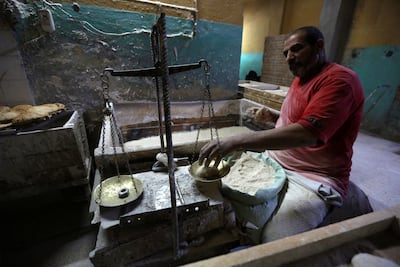Egypt’s prime minister on Sunday offered a detailed and daunting review of the challenges facing his country’s economy as it reels from the effects of the Russia-Ukraine war.
In a televised news conference, Mustafa Madbouli sought to reassure Egyptians that his Cabinet was doing everything it could to weather the crisis but did not shy away from sharing the magnitude of the country’s economic woes.
He spoke of a significantly higher import bill, the flight of $20 billion in “hot [foreign] money” and a halt of tourist arrivals from the two warring nations who normally account for a third of all Egypt's visitors. Significantly, he also listed a number of fiscal targets that Egypt hoped to achieve.
“It’s a crisis added to another crisis,” said Mr Madbouli, referring to the economic woes caused by the coronavirus pandemic from which Egypt was recovering when the war broke out in February.
“Uncertainty is prevailing and no one can tell what will happen tomorrow."
The most populous Arab nation with 103 million people, Egypt reacted swiftly to the fallout from the war by devaluing its currency by 14 per cent against the US dollar, banning the export of vital foodstuffs and adopting a costly stimulus package to support the economy.

In March, Egypt opened negotiations with the IMF on technical support and possible funding to help it weather the crisis. Mr Madbouli said on Sunday that Egypt and the IMF were expected to reach an agreement within a month.
The fallout from the war has added to the effects of the disruption to the global supply chain caused by the pandemic, he said.
President Abdel Fattah El Sisi, the architect and driving force behind Egypt’s ambitious economic reform, has described the fallout from the Russia-Ukraine war as “unprecedented”.
In a series of televised comments since March, Mr El Sisi has shared details of the impact of the war on Egypt and how it intended to handle it, including incentives to bolster the stock market and increase the private sector’s share of investment.
Mr Madbouli gave more details of the crisis on Sunday and even acknowledged some of the more serious challenges, such as the growth of the public debt.
He said Egypt, the world’s largest wheat importer, was currently buying the product on world markets at $435 a tonne, up from $270 before the war. Russia and Ukraine accounted for the majority of Egypt’s wheat imports — a total of about 13 million tonnes last year — forcing it to seek alternative sources.

More than 70 million Egyptians rely on cheap bread provided by the state under a subsidy card system catering for low and middle-income Egyptians. Bread, a staple for most Egyptians, is a politically sensitive food item in a country where nearly half of the population is under or hovering above the poverty line.
The government has kept the price of subsidised bread unchanged, despite the surge in wheat prices, and moved to control the price of free-market bread after it rose by 50 per cent in the immediate aftermath of the Russian invasion. It also has offered financial incentives to local wheat growers to ensure they supply the state with nearly six million tonnes during the continuing harvest season.
Mr Madbouli said Egypt planned to spend 130 billion pounds ($700 million) to absorb the direct effects of the war in the fiscal year starting on July 1; and another 335bn pounds to offset its indirect effects.
He said the private sector would account for 65 per cent of all investment in the country within three years, up from about 30 per cent at present. He said the government aimed to reduce total debt to 75 per cent of gross domestic product in the next four years from the current 86 per cent, and the budget deficit to 5 per cent from 6.2 per cent
Egypt wants to achieve a primary surplus of about 1.5 per cent of GDP in the current fiscal year, which would rise to 2 per cent over the next four years, he said.
“Thanks be to God, Egypt has been able to face the world crises of the past three years,” Mr Madbouli said. “We would have seen total collapse in many areas had it not been for the economic reforms we introduced.”


